MGT712 - Corporate Governance, Ethics, and Social Responsibility Essay
VerifiedAdded on 2023/05/31
|7
|1223
|122
Essay
AI Summary
This essay discusses the importance of corporate governance, ethics, and social responsibility in modern organizations. It highlights how unethical practices can lead to criticism and difficulty for businesses, emphasizing the need for strong corporate governance to balance the interests of stakeholders, including shareholders, government, local communities, and employees. The essay also explores the role of ethical organizational culture in fostering customer dependency, satisfaction, and a safe working environment, ultimately leading to increased profitability and efficiency. Furthermore, it addresses the significance of stakeholders, differentiating between primary and secondary stakeholders and examining potential issues that may arise within these groups. The conclusion emphasizes the crucial role stakeholders play in business and how their importance varies depending on the company's objectives and culture. This resource is available on Desklib, a platform offering a wealth of study tools and solved assignments for students.
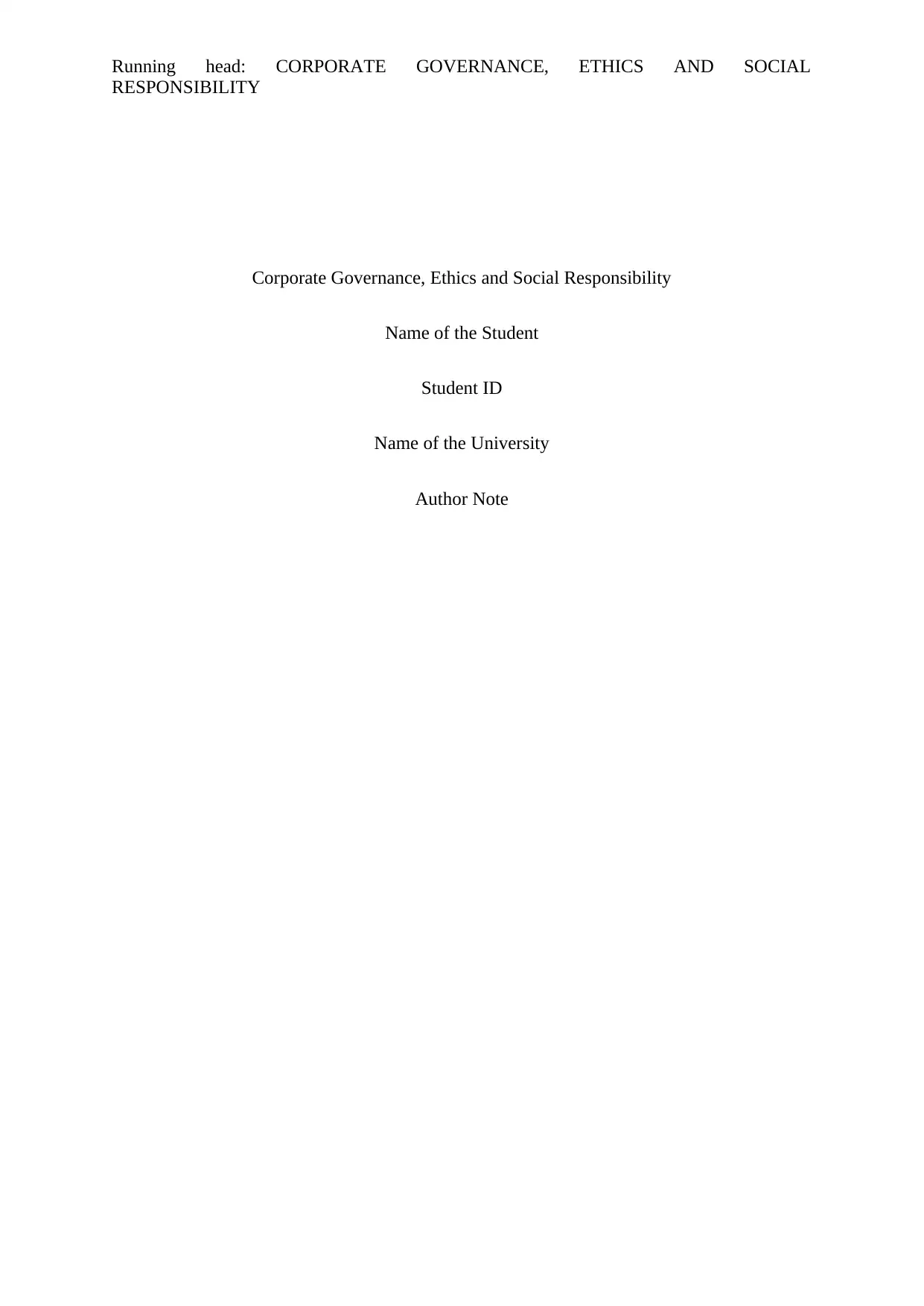
Running head: CORPORATE GOVERNANCE, ETHICS AND SOCIAL
RESPONSIBILITY
Corporate Governance, Ethics and Social Responsibility
Name of the Student
Student ID
Name of the University
Author Note
RESPONSIBILITY
Corporate Governance, Ethics and Social Responsibility
Name of the Student
Student ID
Name of the University
Author Note
Paraphrase This Document
Need a fresh take? Get an instant paraphrase of this document with our AI Paraphraser
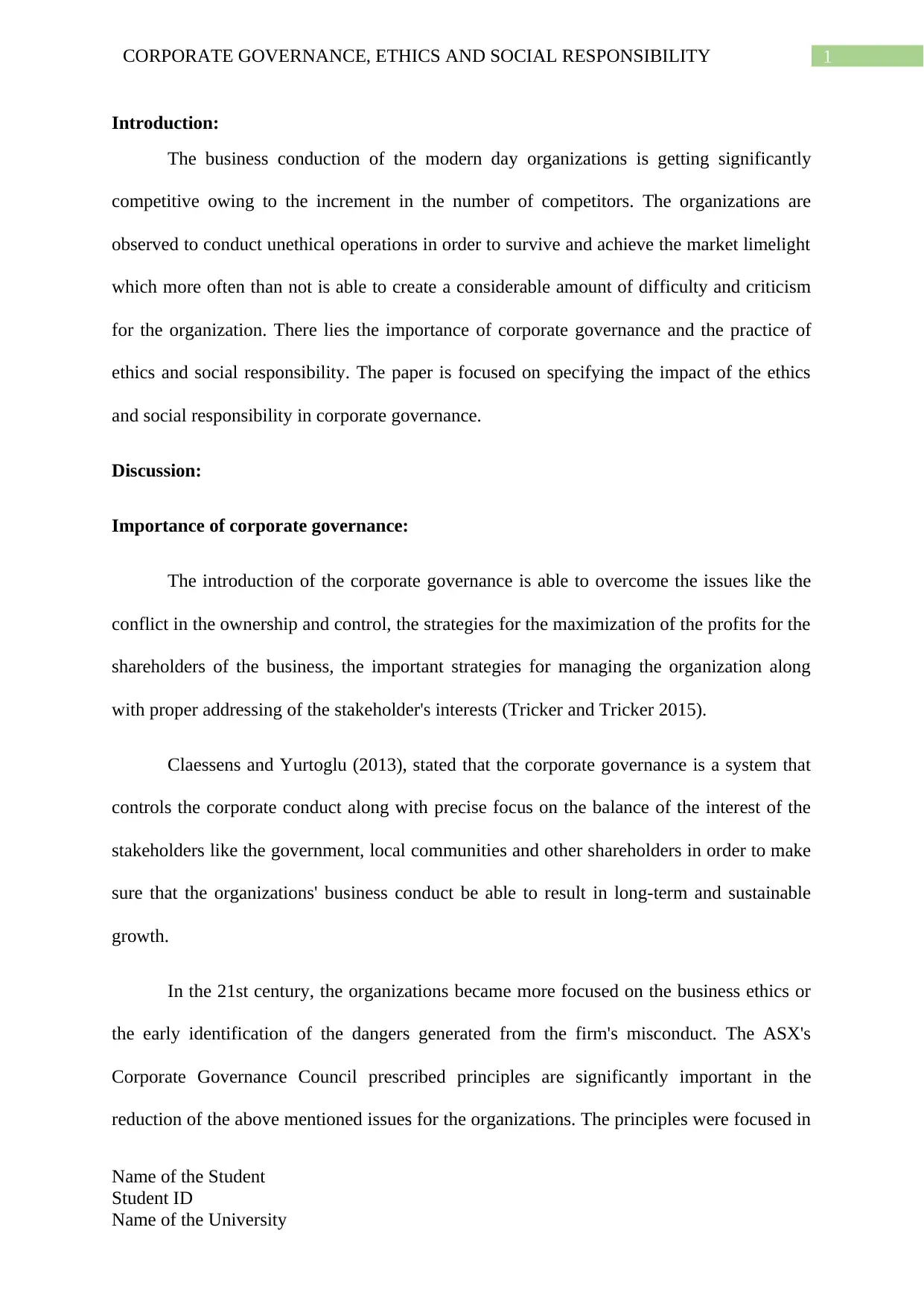
1CORPORATE GOVERNANCE, ETHICS AND SOCIAL RESPONSIBILITY
Introduction:
The business conduction of the modern day organizations is getting significantly
competitive owing to the increment in the number of competitors. The organizations are
observed to conduct unethical operations in order to survive and achieve the market limelight
which more often than not is able to create a considerable amount of difficulty and criticism
for the organization. There lies the importance of corporate governance and the practice of
ethics and social responsibility. The paper is focused on specifying the impact of the ethics
and social responsibility in corporate governance.
Discussion:
Importance of corporate governance:
The introduction of the corporate governance is able to overcome the issues like the
conflict in the ownership and control, the strategies for the maximization of the profits for the
shareholders of the business, the important strategies for managing the organization along
with proper addressing of the stakeholder's interests (Tricker and Tricker 2015).
Claessens and Yurtoglu (2013), stated that the corporate governance is a system that
controls the corporate conduct along with precise focus on the balance of the interest of the
stakeholders like the government, local communities and other shareholders in order to make
sure that the organizations' business conduct be able to result in long-term and sustainable
growth.
In the 21st century, the organizations became more focused on the business ethics or
the early identification of the dangers generated from the firm's misconduct. The ASX's
Corporate Governance Council prescribed principles are significantly important in the
reduction of the above mentioned issues for the organizations. The principles were focused in
Name of the Student
Student ID
Name of the University
Introduction:
The business conduction of the modern day organizations is getting significantly
competitive owing to the increment in the number of competitors. The organizations are
observed to conduct unethical operations in order to survive and achieve the market limelight
which more often than not is able to create a considerable amount of difficulty and criticism
for the organization. There lies the importance of corporate governance and the practice of
ethics and social responsibility. The paper is focused on specifying the impact of the ethics
and social responsibility in corporate governance.
Discussion:
Importance of corporate governance:
The introduction of the corporate governance is able to overcome the issues like the
conflict in the ownership and control, the strategies for the maximization of the profits for the
shareholders of the business, the important strategies for managing the organization along
with proper addressing of the stakeholder's interests (Tricker and Tricker 2015).
Claessens and Yurtoglu (2013), stated that the corporate governance is a system that
controls the corporate conduct along with precise focus on the balance of the interest of the
stakeholders like the government, local communities and other shareholders in order to make
sure that the organizations' business conduct be able to result in long-term and sustainable
growth.
In the 21st century, the organizations became more focused on the business ethics or
the early identification of the dangers generated from the firm's misconduct. The ASX's
Corporate Governance Council prescribed principles are significantly important in the
reduction of the above mentioned issues for the organizations. The principles were focused in
Name of the Student
Student ID
Name of the University
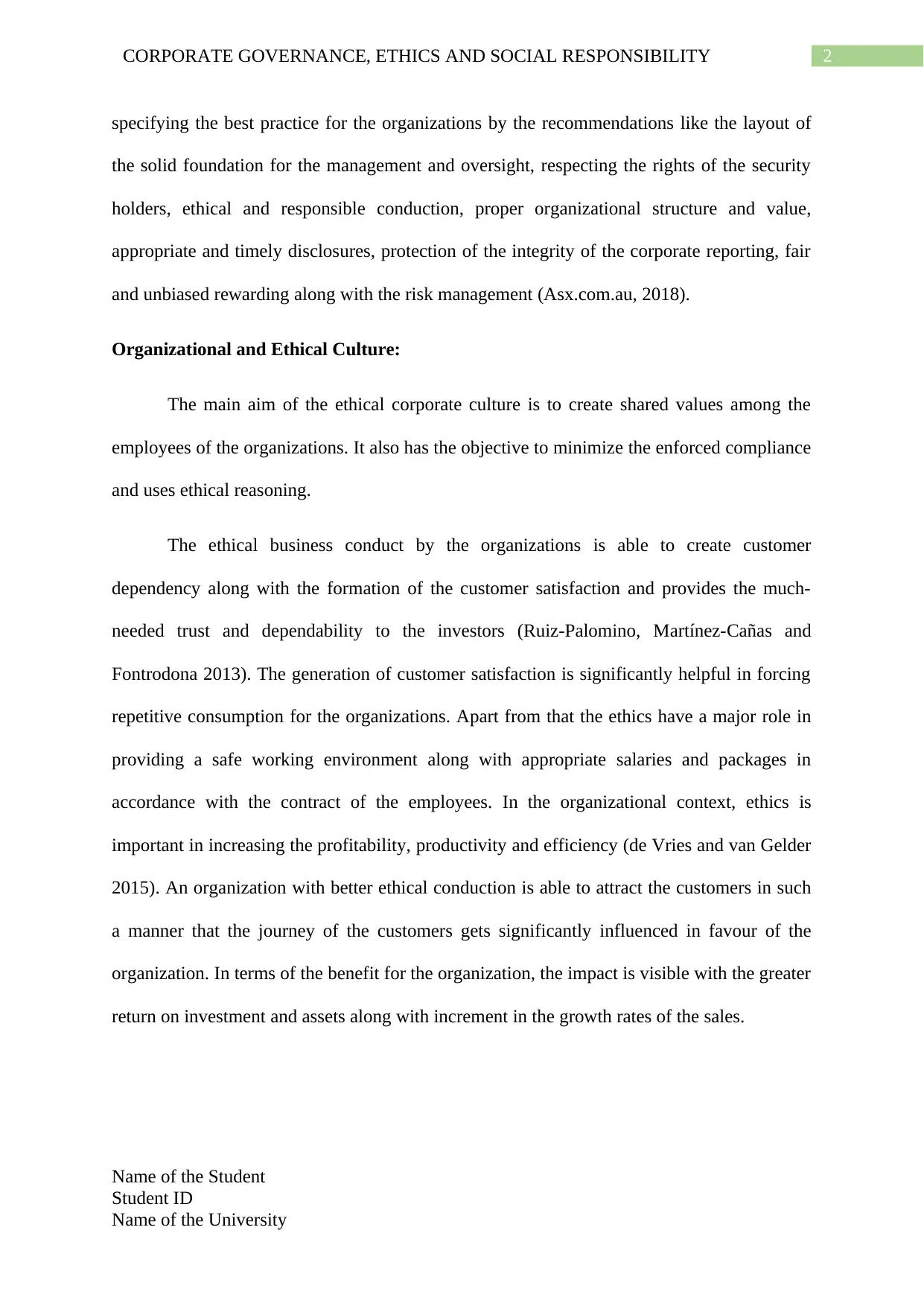
2CORPORATE GOVERNANCE, ETHICS AND SOCIAL RESPONSIBILITY
specifying the best practice for the organizations by the recommendations like the layout of
the solid foundation for the management and oversight, respecting the rights of the security
holders, ethical and responsible conduction, proper organizational structure and value,
appropriate and timely disclosures, protection of the integrity of the corporate reporting, fair
and unbiased rewarding along with the risk management (Asx.com.au, 2018).
Organizational and Ethical Culture:
The main aim of the ethical corporate culture is to create shared values among the
employees of the organizations. It also has the objective to minimize the enforced compliance
and uses ethical reasoning.
The ethical business conduct by the organizations is able to create customer
dependency along with the formation of the customer satisfaction and provides the much-
needed trust and dependability to the investors (Ruiz-Palomino, Martínez-Cañas and
Fontrodona 2013). The generation of customer satisfaction is significantly helpful in forcing
repetitive consumption for the organizations. Apart from that the ethics have a major role in
providing a safe working environment along with appropriate salaries and packages in
accordance with the contract of the employees. In the organizational context, ethics is
important in increasing the profitability, productivity and efficiency (de Vries and van Gelder
2015). An organization with better ethical conduction is able to attract the customers in such
a manner that the journey of the customers gets significantly influenced in favour of the
organization. In terms of the benefit for the organization, the impact is visible with the greater
return on investment and assets along with increment in the growth rates of the sales.
Name of the Student
Student ID
Name of the University
specifying the best practice for the organizations by the recommendations like the layout of
the solid foundation for the management and oversight, respecting the rights of the security
holders, ethical and responsible conduction, proper organizational structure and value,
appropriate and timely disclosures, protection of the integrity of the corporate reporting, fair
and unbiased rewarding along with the risk management (Asx.com.au, 2018).
Organizational and Ethical Culture:
The main aim of the ethical corporate culture is to create shared values among the
employees of the organizations. It also has the objective to minimize the enforced compliance
and uses ethical reasoning.
The ethical business conduct by the organizations is able to create customer
dependency along with the formation of the customer satisfaction and provides the much-
needed trust and dependability to the investors (Ruiz-Palomino, Martínez-Cañas and
Fontrodona 2013). The generation of customer satisfaction is significantly helpful in forcing
repetitive consumption for the organizations. Apart from that the ethics have a major role in
providing a safe working environment along with appropriate salaries and packages in
accordance with the contract of the employees. In the organizational context, ethics is
important in increasing the profitability, productivity and efficiency (de Vries and van Gelder
2015). An organization with better ethical conduction is able to attract the customers in such
a manner that the journey of the customers gets significantly influenced in favour of the
organization. In terms of the benefit for the organization, the impact is visible with the greater
return on investment and assets along with increment in the growth rates of the sales.
Name of the Student
Student ID
Name of the University
⊘ This is a preview!⊘
Do you want full access?
Subscribe today to unlock all pages.

Trusted by 1+ million students worldwide
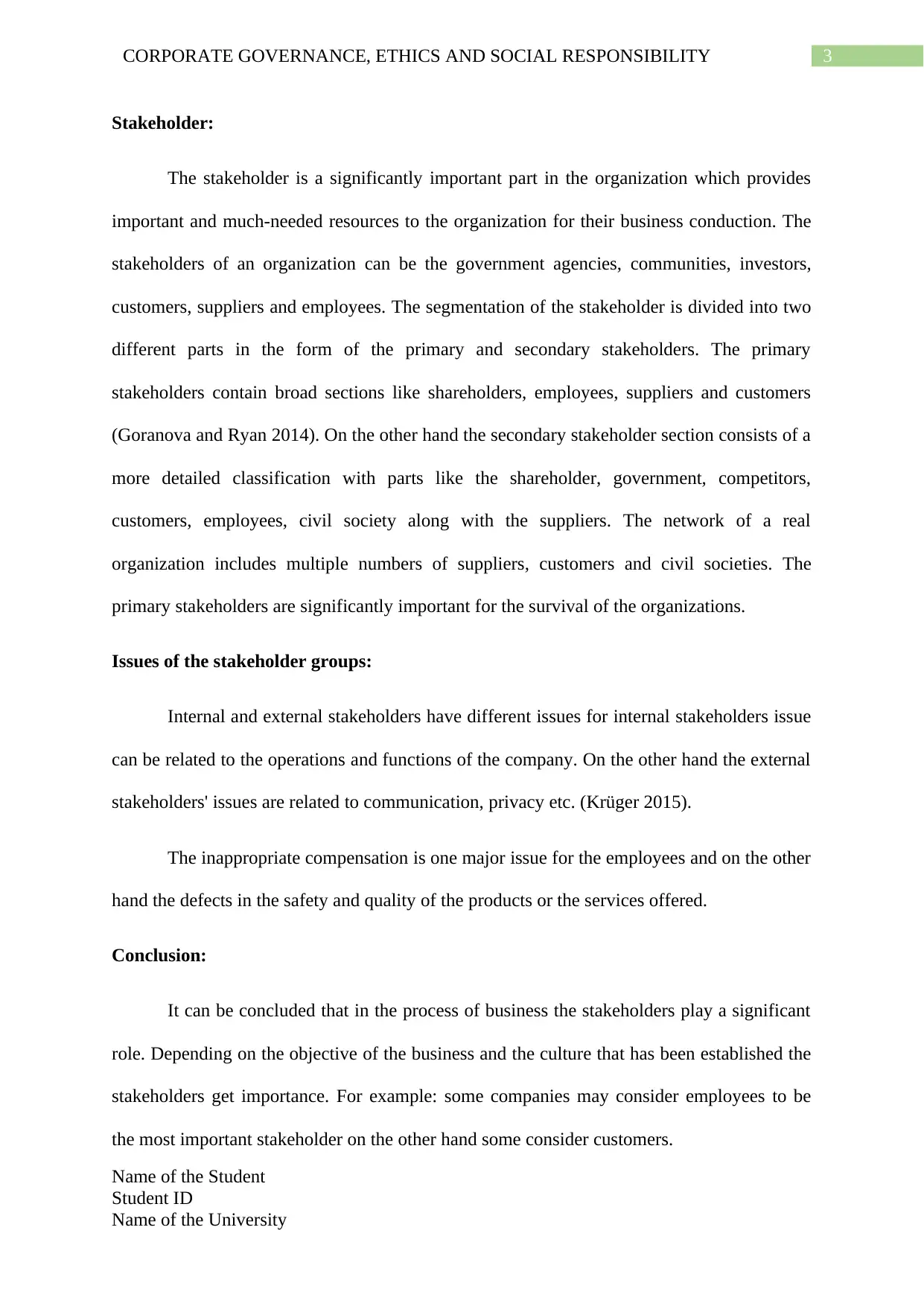
3CORPORATE GOVERNANCE, ETHICS AND SOCIAL RESPONSIBILITY
Stakeholder:
The stakeholder is a significantly important part in the organization which provides
important and much-needed resources to the organization for their business conduction. The
stakeholders of an organization can be the government agencies, communities, investors,
customers, suppliers and employees. The segmentation of the stakeholder is divided into two
different parts in the form of the primary and secondary stakeholders. The primary
stakeholders contain broad sections like shareholders, employees, suppliers and customers
(Goranova and Ryan 2014). On the other hand the secondary stakeholder section consists of a
more detailed classification with parts like the shareholder, government, competitors,
customers, employees, civil society along with the suppliers. The network of a real
organization includes multiple numbers of suppliers, customers and civil societies. The
primary stakeholders are significantly important for the survival of the organizations.
Issues of the stakeholder groups:
Internal and external stakeholders have different issues for internal stakeholders issue
can be related to the operations and functions of the company. On the other hand the external
stakeholders' issues are related to communication, privacy etc. (Krüger 2015).
The inappropriate compensation is one major issue for the employees and on the other
hand the defects in the safety and quality of the products or the services offered.
Conclusion:
It can be concluded that in the process of business the stakeholders play a significant
role. Depending on the objective of the business and the culture that has been established the
stakeholders get importance. For example: some companies may consider employees to be
the most important stakeholder on the other hand some consider customers.
Name of the Student
Student ID
Name of the University
Stakeholder:
The stakeholder is a significantly important part in the organization which provides
important and much-needed resources to the organization for their business conduction. The
stakeholders of an organization can be the government agencies, communities, investors,
customers, suppliers and employees. The segmentation of the stakeholder is divided into two
different parts in the form of the primary and secondary stakeholders. The primary
stakeholders contain broad sections like shareholders, employees, suppliers and customers
(Goranova and Ryan 2014). On the other hand the secondary stakeholder section consists of a
more detailed classification with parts like the shareholder, government, competitors,
customers, employees, civil society along with the suppliers. The network of a real
organization includes multiple numbers of suppliers, customers and civil societies. The
primary stakeholders are significantly important for the survival of the organizations.
Issues of the stakeholder groups:
Internal and external stakeholders have different issues for internal stakeholders issue
can be related to the operations and functions of the company. On the other hand the external
stakeholders' issues are related to communication, privacy etc. (Krüger 2015).
The inappropriate compensation is one major issue for the employees and on the other
hand the defects in the safety and quality of the products or the services offered.
Conclusion:
It can be concluded that in the process of business the stakeholders play a significant
role. Depending on the objective of the business and the culture that has been established the
stakeholders get importance. For example: some companies may consider employees to be
the most important stakeholder on the other hand some consider customers.
Name of the Student
Student ID
Name of the University
Paraphrase This Document
Need a fresh take? Get an instant paraphrase of this document with our AI Paraphraser

4CORPORATE GOVERNANCE, ETHICS AND SOCIAL RESPONSIBILITY
Name of the Student
Student ID
Name of the University
Name of the Student
Student ID
Name of the University
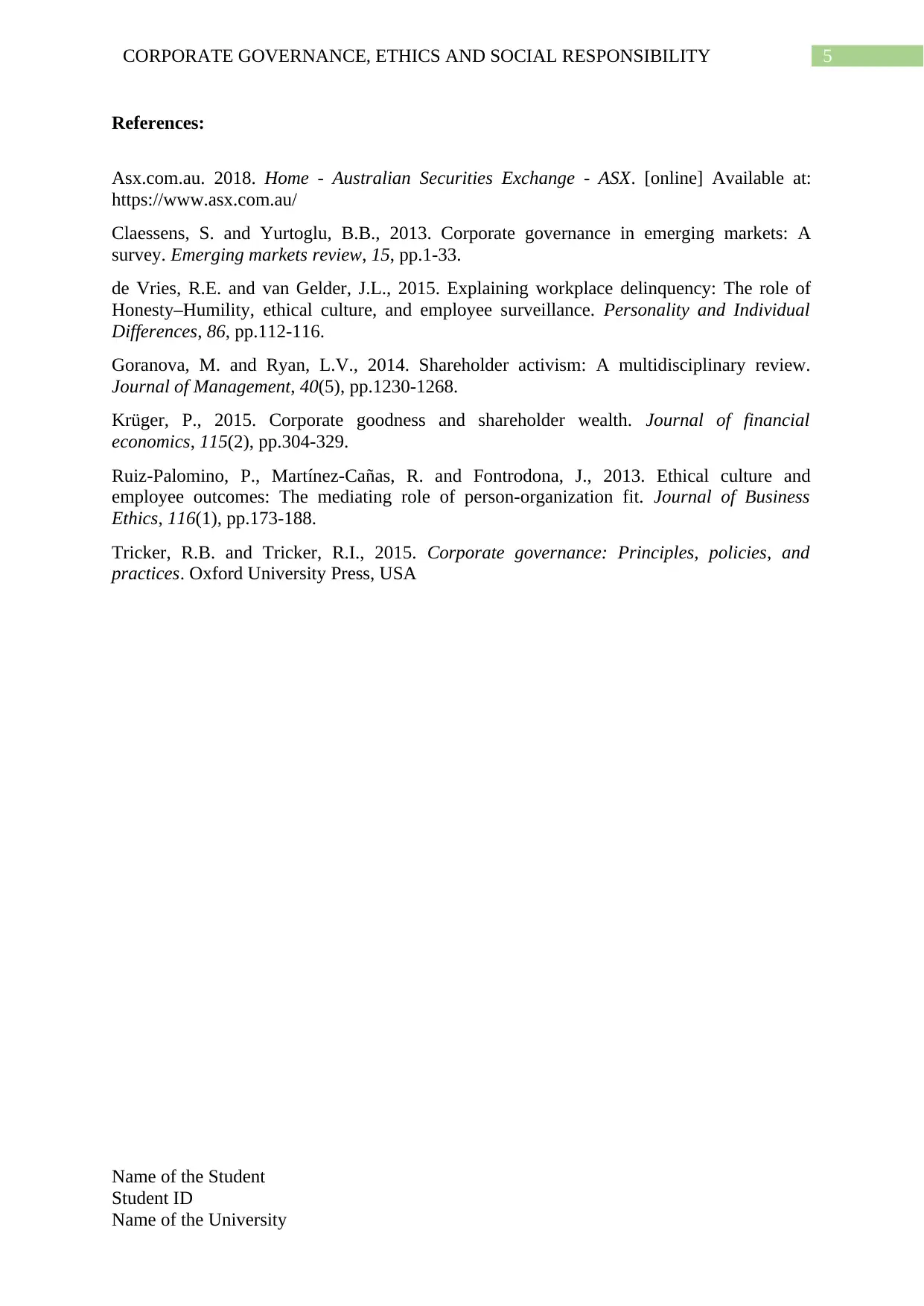
5CORPORATE GOVERNANCE, ETHICS AND SOCIAL RESPONSIBILITY
References:
Asx.com.au. 2018. Home - Australian Securities Exchange - ASX. [online] Available at:
https://www.asx.com.au/
Claessens, S. and Yurtoglu, B.B., 2013. Corporate governance in emerging markets: A
survey. Emerging markets review, 15, pp.1-33.
de Vries, R.E. and van Gelder, J.L., 2015. Explaining workplace delinquency: The role of
Honesty–Humility, ethical culture, and employee surveillance. Personality and Individual
Differences, 86, pp.112-116.
Goranova, M. and Ryan, L.V., 2014. Shareholder activism: A multidisciplinary review.
Journal of Management, 40(5), pp.1230-1268.
Krüger, P., 2015. Corporate goodness and shareholder wealth. Journal of financial
economics, 115(2), pp.304-329.
Ruiz-Palomino, P., Martínez-Cañas, R. and Fontrodona, J., 2013. Ethical culture and
employee outcomes: The mediating role of person-organization fit. Journal of Business
Ethics, 116(1), pp.173-188.
Tricker, R.B. and Tricker, R.I., 2015. Corporate governance: Principles, policies, and
practices. Oxford University Press, USA
Name of the Student
Student ID
Name of the University
References:
Asx.com.au. 2018. Home - Australian Securities Exchange - ASX. [online] Available at:
https://www.asx.com.au/
Claessens, S. and Yurtoglu, B.B., 2013. Corporate governance in emerging markets: A
survey. Emerging markets review, 15, pp.1-33.
de Vries, R.E. and van Gelder, J.L., 2015. Explaining workplace delinquency: The role of
Honesty–Humility, ethical culture, and employee surveillance. Personality and Individual
Differences, 86, pp.112-116.
Goranova, M. and Ryan, L.V., 2014. Shareholder activism: A multidisciplinary review.
Journal of Management, 40(5), pp.1230-1268.
Krüger, P., 2015. Corporate goodness and shareholder wealth. Journal of financial
economics, 115(2), pp.304-329.
Ruiz-Palomino, P., Martínez-Cañas, R. and Fontrodona, J., 2013. Ethical culture and
employee outcomes: The mediating role of person-organization fit. Journal of Business
Ethics, 116(1), pp.173-188.
Tricker, R.B. and Tricker, R.I., 2015. Corporate governance: Principles, policies, and
practices. Oxford University Press, USA
Name of the Student
Student ID
Name of the University
⊘ This is a preview!⊘
Do you want full access?
Subscribe today to unlock all pages.

Trusted by 1+ million students worldwide
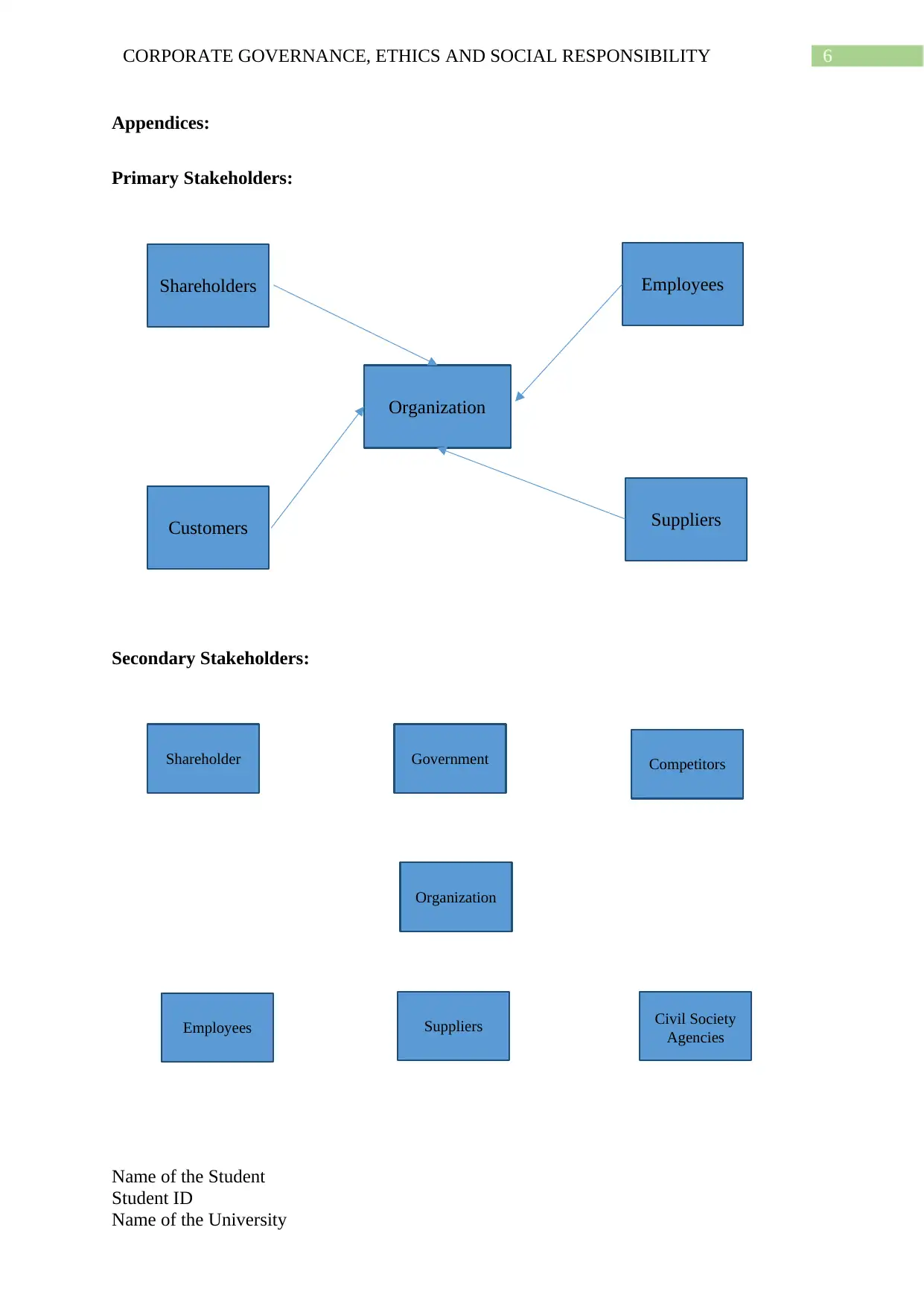
6CORPORATE GOVERNANCE, ETHICS AND SOCIAL RESPONSIBILITY
Organization
Shareholders
Customers
Employees
Suppliers
Organization
Shareholder
SuppliersEmployees Civil Society
Agencies
Government Competitors
Appendices:
Primary Stakeholders:
Secondary Stakeholders:
Name of the Student
Student ID
Name of the University
Organization
Shareholders
Customers
Employees
Suppliers
Organization
Shareholder
SuppliersEmployees Civil Society
Agencies
Government Competitors
Appendices:
Primary Stakeholders:
Secondary Stakeholders:
Name of the Student
Student ID
Name of the University
1 out of 7
Related Documents
Your All-in-One AI-Powered Toolkit for Academic Success.
+13062052269
info@desklib.com
Available 24*7 on WhatsApp / Email
![[object Object]](/_next/static/media/star-bottom.7253800d.svg)
Unlock your academic potential
Copyright © 2020–2026 A2Z Services. All Rights Reserved. Developed and managed by ZUCOL.





